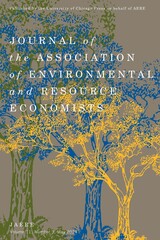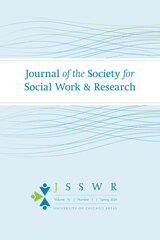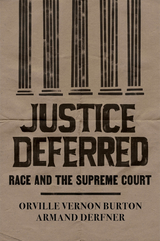23 start with H start with H
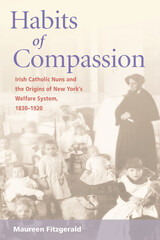
The Irish-Catholic Sisters accomplished tremendously successful work in founding charitable organizations in New York City from the Irish famine through the early twentieth century. Maureen Fitzgerald argues that their championing of the rights of the poor—especially poor women—resulted in an explosion of state-supported services and programs.
Parting from Protestant belief in meager and means-tested aid, Irish Catholic nuns argued for an approach based on compassion for the poor. Fitzgerald positions the nuns' activism as resistance to Protestantism's cultural hegemony. As she shows, Roman Catholic nuns offered strong and unequivocal moral leadership in condemning those who punished the poor for their poverty and unmarried women for sexual transgression. Fitzgerald also delves into the nuns' own communities, from the class-based hierarchies within the convents to the political power they wielded within the city. That power, amplified by an alliance with the local Irish Catholic political machine, allowed the women to expand public charities in the city on an unprecedented scale.
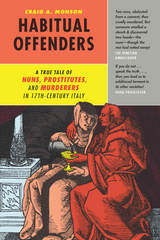
Drawing on over four thousand pages of primary sources, the intrepid Craig A. Monson reconstructs this fascinating history of crime and punishment in seventeenth-century Italy. Along the way, he explores Italy’s back streets and back stairs, giving us access to voices we rarely encounter in conventional histories: prostitutes and maidservants, mercenaries and bandits, along with other “dubious” figures negotiating the boundaries of polite society. Painstakingly researched and breathlessly told, Habitual Offenders will delight historians and true-crime fans alike.
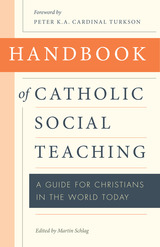
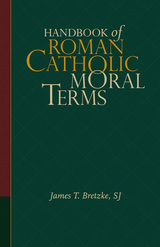
The Handbook of Roman Catholic Moral Terms contains more than 800 moral terms, offering concise definitions, historical context, and illustrations of how these terms are used in the Catholic tradition, including Church teaching and documents.
James T. Bretzke, SJ, places Catholic tradition in a contemporary context in order to illuminate the continuities as well as discontinuities of Church teaching and key directions of Catholic thought. The author also provides extensive cross-referencing and bibliographic suggestions for further research.
Designed to serve as a vital reference work for libraries, students and scholars of theology, priests and pastoral ministers, as well as all adults interested in theological enrichment or continuing education, the Handbook of Roman Catholic Moral Terms is the most comprehensive post–Vatican II work of its kind available in English.

What, exactly, does it mean to be human? It is an age-old question, one for which theology, philosophy, science, and medicine have all provided different answers. But though a unified response to the question can no longer be taken for granted, how we answer it frames the wide range of different norms, principles, values, and intuitions that characterize today's bioethical discussions. If we don't know what it means to be human, how can we judge whether biomedical sciences threaten or enhance our humanity?
This fundamental question, however, receives little attention in the study of bioethics. In a field consumed with the promises and perils of new medical discoveries, emerging technologies, and unprecedented social change, current conversations about bioethics focus primarily on questions of harm and benefit, patient autonomy, and equality of health care distribution. Prevailing models of medical ethics emphasize human capacity for self-control and self-determination, rarely considering such inescapable dimensions of the human condition as disability, loss, and suffering, community and dignity, all of which make it difficult for us to be truly independent.
In Health and Human Flourishing, contributors from a wide range of disciplines mine the intersection of the secular and the religious, the medical and the moral, to unearth the ethical and clinical implications of these facets of human existence. Their aim is a richer bioethics, one that takes into account the roles of vulnerability, dignity, integrity, and relationality in human affliction as well as human thriving. Including an examination of how a theological anthropology—a theological understanding of what it means to be a human being—can help us better understand health care, social policy, and science, this thought-provoking anthology will inspire much-needed conversation among philosophers, theologians, and health care professionals.

Health Care Ethics is a comprehensive study of significant issues affecting health care and the ethics of health care from the perspective of Catholic theology. It aims to help Christian, and especially Catholic, health care professionals solve concrete problems in terms of principles rooted in scripture and tested by individual experience; however, its basis in real medical experience makes this book a valuable resource for anyone with a general interest in health care ethics.
This fifth edition, which includes important contributions by Jean deBlois, C.S.J., considers everyday ethical questions and dilemmas in clinical care and deals more deeply with issues of women's health, mental health, sexual orientation, artificial reproduction, and the new social issues in health care. The authors devote special attention to the various ethical theories currently in use in the United States while clearly presenting a method of ethical decision making based in the Catholic tradition. They discuss the needs of the human person, outlining what it means to be human, both as an individual and as part of a community.
This volume has been significantly updated to include new discussions of recent clinical innovations and theoretical issues that have arisen in the field:
• the Human Genome Project• efforts to control sexual selection of infants• efforts to genetically modify the human genotype and phenotype• the development of palliative care as a medical specialty• the acceptance of non-heart beating persons as organ donors• embryo development and stem cell research• reconstructive and cosmetic surgery• nutrition and obesity• medical mistakes• the negative effects of managed care on the patient-physician relationship• recent papal allocution regarding care of patients in a persistent vegetative state and palliative care for dying patients

This fourth edition of Health Care Ethics provides a contemporary study of broad and major issues affecting health care and the ethics of health care from the perspective of Catholic teachings and theological investigation.
It aims to help Christian, and especially Catholic, health care professionals solve concrete problems in terms of principles rooted in Scripture and tested by individual experience.
Since the last edition of Health Care Ethics, there have been many changes in the fields of health care medicine and theology that have necessitated a fourth edition. Ashley and O'Rourke have revised their seminal work to address the publication of significant documents by the Church and the restructuring of the health care system.
Features of the revised fourth edition:
• Discusses significant Church documents issued since the third edition includes "The Splendor of Truth" (Veritatis Splendor), and the "Gospel of Life" (Evangelium Vitae); the "Instruction on the Vocation of Theologians"; the Catechism of the Catholic Church; and the Revised Ethical and Religious Directives for Catholic Health Services.
• Examines the implications of managed care techniques.
• Probes such changes in the practice of medicine as the new emphasis on preventive care, the involvement of individuals in their own care, greater use of pharmaceuticals in psychiatry, and the greater role of genetics in diagnosis and prognosis.
• Explores the quest for more compassionate care of the dying.
• Updates the bibliography.
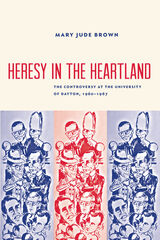

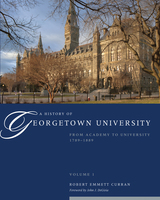
The discovery and imparting of knowledge are the essential undertakings of any university. Such purposes determined John Carroll, SJ's modest and surprisingly ecumenical proposal to establish an academy on the banks of the Potomac for the education of the young in the early republic. What began earnestly in 1789 still continues today: the idea of Georgetown University as a Catholic university situated squarely in the American experience.
Beautifully designed with over 300 illustrations and photographs, A History of Georgetown University tells the remarkable story of the administrators, boards, faculty, students, and programs that have made Georgetown a leading institution of higher education. With a keen eye for detail, historian Robert Emmett Curran—a member of the Georgetown community for over three decades—explores the broader perspective of Georgetown's sense of identity and its place in American culture.
Volume One traces Georgetown’s evolution during its first century, from its beginnings as an academy within the American Catholic community of the Revolutionary War era through its flowering as a college before the Civil War to its postbellum achievements as a university. Volume Two highlights the efforts of administrators and faculty over the next seventy-five years to make Georgetown an ascending and increasingly diverse institution with a range of graduate programs and professional schools. Volume Three examines Georgetown’s remarkable rise to prominence as an internationally recognized research university—both culturally engaged and cosmopolitan while remaining grounded in its Catholic and Jesuit character.
Each volume features numerous illustrations, photographs, and appendices that include student demographics, enrollments, and lists of board members.
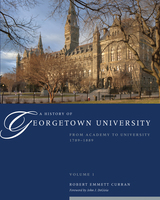
The discovery and imparting of knowledge are the essential undertakings of any university. Such purposes determined John Carroll, SJ's modest and surprisingly ecumenical proposal to establish an academy on the banks of the Potomac for the education of the young in the early republic. What began earnestly in 1789 still continues today: the idea of Georgetown University as a Catholic university situated squarely in the American experience.
Beautifully designed with over 300 illustrations and photographs, A History of Georgetown University tells the remarkable story of the administrators, boards, faculty, students, and programs that have made Georgetown a leading institution of higher education. With a keen eye for detail, historian Robert Emmett Curran—a member of the Georgetown community for over three decades—explores the broader perspective of Georgetown's sense of identity and its place in American culture.
Volume One traces Georgetown’s evolution during its first century, from its beginnings as an academy within the American Catholic community of the Revolutionary War era through its flowering as a college before the Civil War to its postbellum achievements as a university. Volume Two highlights the efforts of administrators and faculty over the next seventy-five years to make Georgetown an ascending and increasingly diverse institution with a range of graduate programs and professional schools. Volume Three examines Georgetown’s remarkable rise to prominence as an internationally recognized research university—both culturally engaged and cosmopolitan while remaining grounded in its Catholic and Jesuit character.
Each volume features numerous illustrations, photographs, and appendices that include student demographics, enrollments, and lists of board members.
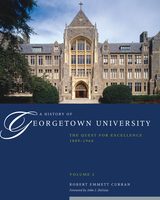
The discovery and imparting of knowledge are the essential undertakings of any university. Such purposes determined John Carroll, SJ's modest and surprisingly ecumenical proposal to establish an academy on the banks of the Potomac for the education of the young in the early republic. What began earnestly in 1789 still continues today: the idea of Georgetown University as a Catholic university situated squarely in the American experience.
Beautifully designed with over 300 illustrations and photographs, A History of Georgetown University tells the remarkable story of the administrators, boards, faculty, students, and programs that have made Georgetown a leading institution of higher education. With a keen eye for detail, historian Robert Emmett Curran—a member of the Georgetown community for over three decades—explores the broader perspective of Georgetown's sense of identity and its place in American culture.
Volume One traces Georgetown’s evolution during its first century, from its beginnings as an academy within the American Catholic community of the Revolutionary War era through its flowering as a college before the Civil War to its postbellum achievements as a university. Volume Two highlights the efforts of administrators and faculty over the next seventy-five years to make Georgetown an ascending and increasingly diverse institution with a range of graduate programs and professional schools. Volume Three examines Georgetown’s remarkable rise to prominence as an internationally recognized research university—both culturally engaged and cosmopolitan while remaining grounded in its Catholic and Jesuit character.
Each volume features numerous illustrations, photographs, and appendices that include student demographics, enrollments, and lists of board members.
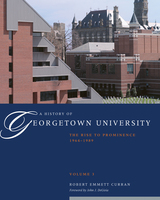
The discovery and imparting of knowledge are the essential undertakings of any university. Such purposes determined John Carroll, SJ's modest and surprisingly ecumenical proposal to establish an academy on the banks of the Potomac for the education of the young in the early republic. What began earnestly in 1789 still continues today: the idea of Georgetown University as a Catholic university situated squarely in the American experience.
Beautifully designed with over 300 illustrations and photographs, A History of Georgetown University tells the remarkable story of the administrators, boards, faculty, students, and programs that have made Georgetown a leading institution of higher education. With a keen eye for detail, historian Robert Emmett Curran—a member of the Georgetown community for over three decades—explores the broader perspective of Georgetown's sense of identity and its place in American culture.
Volume One traces Georgetown’s evolution during its first century, from its beginnings as an academy within the American Catholic community of the Revolutionary War era through its flowering as a college before the Civil War to its postbellum achievements as a university. Volume Two highlights the efforts of administrators and faculty over the next seventy-five years to make Georgetown an ascending and increasingly diverse institution with a range of graduate programs and professional schools. Volume Three examines Georgetown’s remarkable rise to prominence as an internationally recognized research university—both culturally engaged and cosmopolitan while remaining grounded in its Catholic and Jesuit character.
Each volume features numerous illustrations, photographs, and appendices that include student demographics, enrollments, and lists of board members.

As Ice Age glaciers left behind erratics, so the external forces of history tumbled the Irish into America. Existing both out of time and out of space, a diverse range of these Roman-Catholic immigrants saw their new country in a much different way than did the Protestants who settled and claimed it. These erratics chose backward looking tradition and independence over assimilation and embraced a quintessentially Irish form of subversiveness that arose from their culture, faith, and working-class outlook. David M. Emmons draws on decades of research and thought to plumb the mismatch of values between Protestant Americans hostile to Roman Catholicism and the Catholic Irish strangers among them. Joining ethnicity and faith to social class, Emmons explores the unique form of dissidence that arose when Catholic Irish workers and their sympathizers rejected the beliefs and symbols of American capitalism.
A vibrant and original tour de force, History’s Erratics explores the ancestral roots of Irish nonconformity and defiance in America.

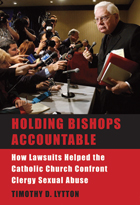
The sexual abuse of children by Catholic clergy is arguably the most acute crisis Catholicism has faced since the Reformation. The prevalence of clergy sexual abuse and its shocking cover-up by church officials have obscured the largely untold story of the tort system’s remarkable success in bringing the scandal to light, focusing attention on the need for institutional reform, and spurring church leaders and public officials into action.
Stories of the tort system as an engine of social justice are rare. Holding Bishops Accountable tells one such story by revealing how pleadings, discovery documents, and depositions fueled media coverage of the scandal. Timothy Lytton shows how the litigation strategy of plaintiffs’ lawyers gave rise to a widespread belief that the real problem was not the actions of individual priests but rather the church’s massive institutional failure. The book documents how church and government policymakers responded to the problem of clergy sexual abuse only under the pressure of private lawsuits.
As Lytton deftly demonstrates, the lessons of clergy sexual abuse litigation give us reason to reconsider the case for tort reform and to look more closely at how tort litigation can enhance the performance of public and private policymaking institutions.
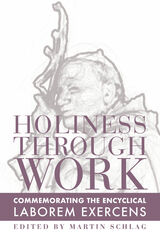
This book is a timely contribution to the field of scholarship that focuses on Catholic Social Thought and is ideally suited for graduate studies and the reader interested in more serious questions in Christian theology.
Giulio Maspero, "The Bible and the Fathers of the Church on Work"
Patricia Ranft, "Work Theology in the High Middle Ages"
Angela Franks, "John Paul II's Metaphysics of Labor"
Deborah Savage, "Confronting a Technocratic Future: Women's Work and the Church's Social Vision"
Martin Schlag, "Contemplation at Work: A Theological Conversation Between John Paul II and Josemaría Escrivá"
Richard Turnbull, "Laborem Exercens: A Protestant Appreciation"
Michael Naughton, "Good Work: Insights from the Subjective Dimension of Work"
Christopher Michaelson, "Subjects and Objects in Meaningful Work"
Javier Ignacio Pinto Garay and Alvaro Pezoa Bissieres, "The Worker and the Transistor: The Dignity of Work and Business Ethics in Global Corporate Practices"
Gonzalo Flores-Castro Lingán, "The Real Work: Making the Encyclical Laborem Exercens Operational"
Geoffrey C. Friesen, "Laborem Exercens and the Subjective Dimension of Work in Economics and Finance"
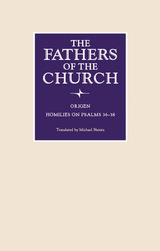
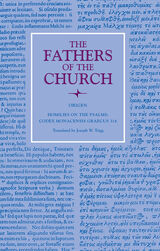
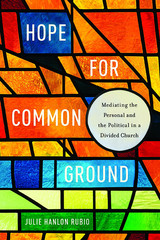
Much like the rest of the country, American Catholics are politically divided, perhaps more so now than at any point in their history. In this learned but accessible work for scholars, students, and religious and lay readers, ethicist Julie Hanlon Rubio suggests that there is a way beyond red versus blue for orthodox and progressive Catholics. In a call for believers on both sides of the liberal-conservative divide to put aside labels and rhetoric, Rubio, a leading scholar in marriage and family for more than twenty years, demonstrates that common ground does exist in the local sphere between the personal and the political.
In Hope for Common Ground, Rubio draws on Catholic Social Thought to explore ways to bring Catholics together. Despite their differences, Catholics across the political spectrum can share responsibility for social sin and work within communities to contribute to social progress. Rubio expands this common space into in-depth discussions on family fragility, poverty, abortion, and end-of-life care. These four issues, though divisive, are part of a seamless worldview that holds all human life as sacred. Rubio argues that if those on different sides focus on what can be done to solve social problems in “the space between” or local communities, opposing sides will see they are not so far apart as they think. The common ground thus created can then lead to far-reaching progress on even the most divisive issues—and help quiet the discord tearing apart the Church.

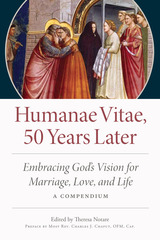
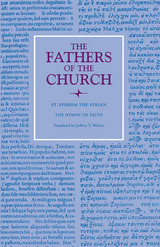
READERS
Browse our collection.
PUBLISHERS
See BiblioVault's publisher services.
STUDENT SERVICES
Files for college accessibility offices.
UChicago Accessibility Resources
home | accessibility | search | about | contact us
BiblioVault ® 2001 - 2024
The University of Chicago Press


